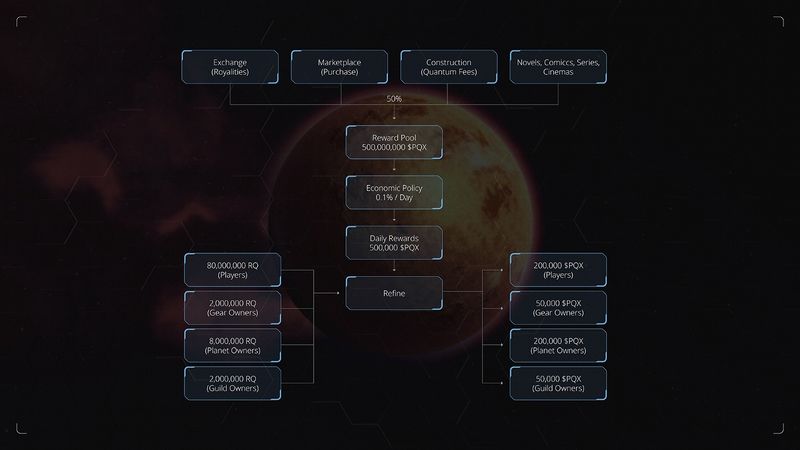Difference between revisions of "Economic Model"
Tag: Reverted |
Tags: Visual edit Manual revert |
||
| Line 30: | Line 30: | ||
These and other policies allow us to balance the economy in the game based on the value of $PQX as well as the revenue per player, providing us with a powerful, sustainable, token economy. | These and other policies allow us to balance the economy in the game based on the value of $PQX as well as the revenue per player, providing us with a powerful, sustainable, token economy. | ||
Revision as of 21:51, 16 May 2022
In any economy, for someone to earn, someone must be spending money. Somehow every token someone is earning by participating in a game must related to what is being spent by other players. Whereas in some games the two are only very loosely connected, the economy of PlanetQuest uses only one token: $PQX.
PQX Utility & Purpose
Used to buy, trade and construct gear and supplies, as well as for interplanetary transport, activation of artifacts and naming of planets, PQX (also known as Quantum) is at the center of the PlanetQuest economy. PQX is obtained by players from an exchange or earned as a reward for their in-game achievements and managing your PQX wisely is one of the key factors to success in PlanetQuest.
Instead of minting whatever quantity of this token is needed to reward the players and NFT owners for their efforts, PlanetQuest tracks how much raw quantum its players and NFT owners have received each day. It also maintains a single rewards pool, which is constantly refilled based on the revenues of the game. Each day, a small portion of this reward pool is set aside as the daily reward. This daily reward is split by the players and NFT owners based on how much raw quantum they accumulated that day. The diagram below shows how Raw Quantum is generated by playing the game and how it is later refined into $PQX.
Please note that the contents of the reward pool and exact economic policy shown here are for illustrative purposes only. Model may still be subject to modifications as PQ team fine-tune the game.
The benefits of PlanetQuest’s economic model
This new approach to the game economy allows PlanetQuest to offer a sustainable economy fueled by $PQX being spent on in-game purchases, construction of gear, royalties from sales and even profits from Novels, Comics and Cinematic spinoffs of the PlanetQuest Multiverse. In fact, if you’ve bought any insignias or are participating in the planet sale, you are already contributing to that economy, as 50% of the revenue for these actions will in the future be used to buy $PQX from the market to be added to the reward pool. Naturally we also have a large emissions and rewards pool to help kickstart this process, with 46% of our token supply already allocated for this purpose.
Aside from the final economy being based on real revenue, there is a lot of additional benefits to this approach:
- If someone were to find an exploit in-game allowing them to generate massive amounts of Raw Quantum, the worst-case scenario is that they take the majority of one daily reward. This can be easily compensated, and the problem fixed. Imagine the impact if instead they got to mint a near infinite amount of utility tokens.
- There’s massive utility for the token as all transactions in the game take place in $PQX.
- The game economy can be easily tweaked on a day-by-day basis to keep the game experience fun and rewarding even in changing market circumstances.
This last point, in particular, is an important one to unpack. Because it’s impossible to predict the exact revenues and player base of a game in advance, having an economic model with few controls, or worse, one which is entirely static, can cause a lot of problems. Instead, the PlanetQuest team (and later the community) will have access to several powerful economic policies that make sure that our multiverse can adapt to such unpredictable factors. Below we discuss just a few of these:
Daily Reward
The daily reward policy takes some part of the reward pool each day to be earned by players and NFT owners. Thanks to being a flexible policy, it can easily be tuned to, for example, increase the reward as the game sees increased spending by a larger number of players.
Planet Population
The planet population limit is a powerful way to tune the average $PQX earned by planet owners and indirectly by guilds. While it’s impossible to predict how much revenue an average player might generate, having the ability to simply increase the planet population limit means we can tune the number of players allowed per planet in such a way that $PQX earned by planet owners and guilds hits the right level.
In-game Pricing
As PlanetQuest grows, the value of $PQX is likely to follow suit. Flexible in-game pricing will allow us to make sure that the costs of constructing gear and purchases on the marketplace continue to make sense, so that everyone can continue to participate in the economy, no matter if 1 $PQX is worth $0.40 or $40.
These and other policies allow us to balance the economy in the game based on the value of $PQX as well as the revenue per player, providing us with a powerful, sustainable, token economy.
